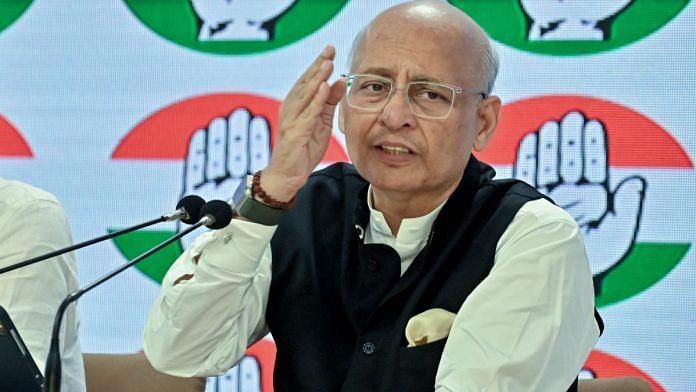New Delhi: The Congress party Friday hit out at the Law Commission’s recommendations on the sedition law, saying that it makes the legislation more “draconian, invasive” and smacks of a “colonial mindset”.
At a press conference at the party headquarters, Congress spokesperson Abhishek Manu Singhvi slammed the Commission’s report for the amendments it had proposed which, he contended, made the law even more stringent.
Singhvi specifically highlighted the panel’s recommendation that the minimum punishment for sedition be increased from three to seven years. He also asserted that the Commission had provided no caveat or safeguard for the law being misused.
“…the 22nd Law Commission of India has recommended that Section 124A of the Indian Penal Code (IPC), which criminalises sedition, should be retained in the statute book with certain and more draconian charges,” he said.
“In a nutshell, the Law Commission proposal makes the existing sedition law far more draconian, invasive and prejudicial by enhancing the lower end of the punishment from three to seven years. It ignores the spirit of the Supreme Court proceedings in May and October last year which has rendered the entire offense of sedition in the country inoperative and clearly intended to be repealed/rendered deal later,” the senior advocate added.
Singhvi also criticised the word “tendency” that the Commission inserted in Section 124A of IPC as a proposed amendment.
“Whoever by words, either spoken or written, or by signs, or by visible representation, or otherwise, brings or attempts to bring into hatred or contempt, or excites or attempts to excite disaffection towards, the Government established by law in lndia, with a tendency to incite violence or cause public disorder shall be punished with imprisonment for life, to which fine may be added, or with imprisonment of either description for a term which may extend to seven years, to which fine may be added, or with fine,” reads the proposed amendment.
While it has stated that the people are at liberty to indulge in healthy and constructive criticism of their government in a democratic set-up, the Commission has contended that Section 124A seeks to penalise “only the pernicious tendency to incite violence or cause public disorder in the guise of exercising right to freedom and expression”.
Singhvi said that the Commission has purported to legislate “what has always been the law in India” since the last 60 years, since the Kedarnath judgment in 1962.
The Congress spokesperson argued that this proposed amendment merely converted a judge-made law into a legislation without any “dilution or elimination” of the sedition offence.
“Why have the cases of sedition burgeoned during the BJP regime? Is the government misusing it as a tool to curb criticism? Why has this government not changed its control freak Sarkar style? Why has this government not been able to shed its colonial mindset while hypocritical swearing against colonialism?” he asked.
Singhvi asserted that the reference to the Commission by the government was “merely a circuitous circumvention” of the “true spirit” of the Supreme Court. He also asked if this was an initial step towards more curbing of dissent ahead of the 2024 Lok Sabha election.
“Why have the cases of sedition only been imposed on the opposition leaders and dissidents? How many BJP leaders have been charged under the law?” he asked.
in its 279th report submitted to the government on 24 May, the Law Commission suggested keeping the sedition law but with amendments. The report stated that the Home Ministry referred the issue to the Commission in 2016.
(Edited by Tony Rai)
Also Read: The events that led up to Indian courts declaring sedition law ‘unconstitutional’ in 1950



